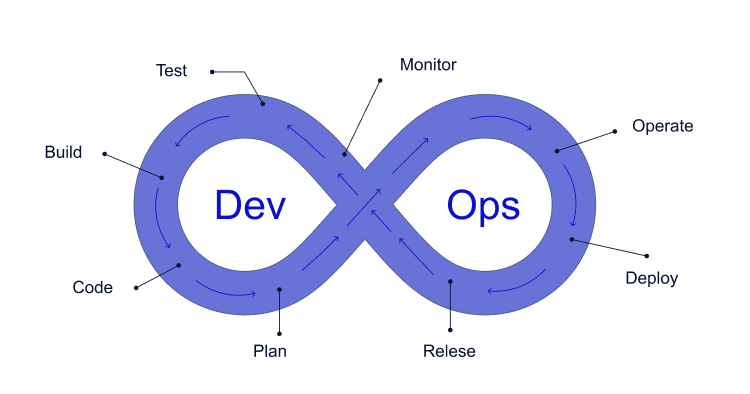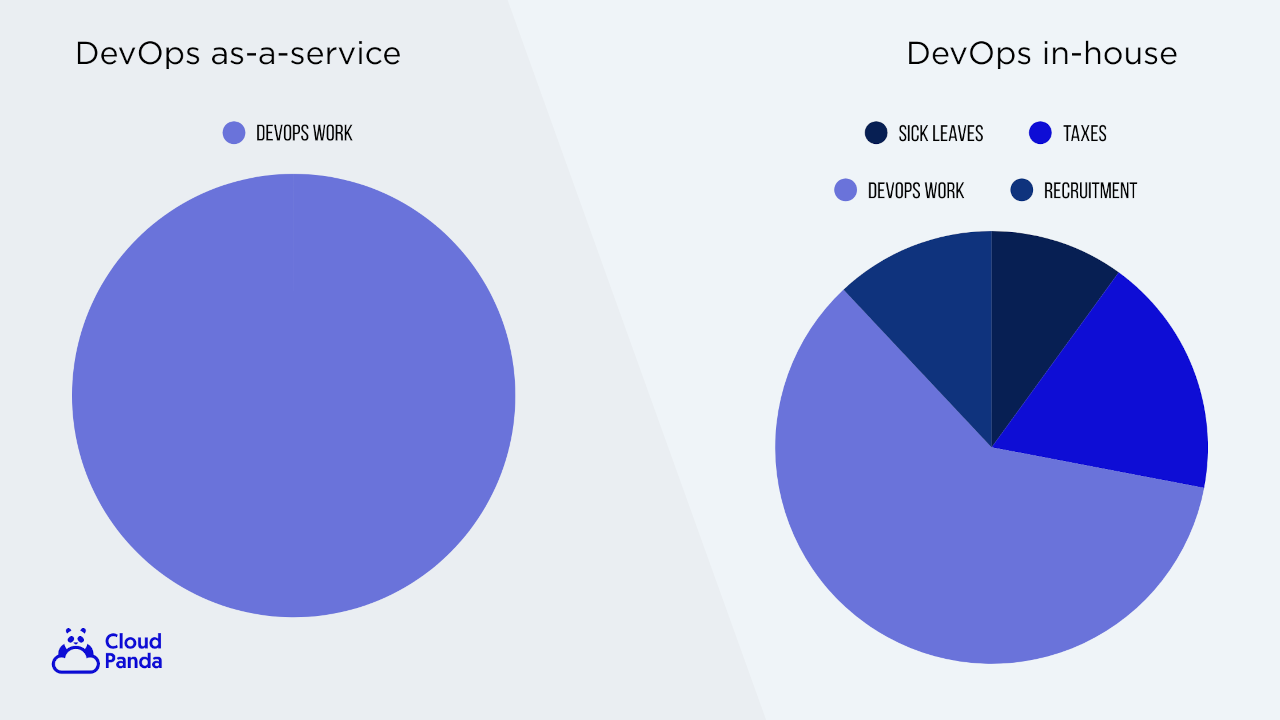You’ve probably heard the term DevOps thrown around in tech meetings, sales decks, and job descriptions. Maybe you even have a DevOps engineer or two on your team. But here’s the real question: what does it actually mean to outsource DevOps — and why are more companies doing it?
Whether you’re starting from scratch or already juggling infrastructure in-house, this guide breaks down when outsourcing makes sense, what the trade-offs look like, and how it can impact your speed, security, and sanity. Let’s dive in.
What does a DevOps engineer do?
Let's begin with a simple question: do you know what DevOps engineers do?
DevOps encompasses testing, monitoring, operating, building, coding, deploying, planning, and releasing software. Does that sound a lot? Good. If you know how broad the DevOps team's responsibilities are, you know what kind of people you need to hire.

Have you noticed that this image above looks like the infinity symbol? Well done, give yourself a pat on the back. Continuous Integration and Continuous Delivery/Deployment (CI/CD) processes operate in a constant loop. They involve ongoing development, testing, integration, and deployment of code to improve software and continually deliver updates to users.
So, when do you need a dedicated DevOps engineer?
- If you need a high-performing app with quick time to market.
- You want to be sure that software meets user's needs (and those are changing).
- You need to keep infrastructure and operations secure.
- You require rapid software updates.
If you checked at least one case from the list above, you must hire a DevOps.
DevOps in-house or outsourced?
Many obstacles can emerge when an employment contract with one firm binds DevOps. Let's delve into some of these challenges:
Limited flexibility during vacations or emergencies
With only one DevOps engineer on board, the absence due to vacations, illnesses, or emergencies can significantly disrupt operations. This constraint can delay project timelines and hinder the team's overall efficiency.
Resource constraints for larger projects
Undertaking significant projects with limited resources becomes daunting. When confronted with complex or extensive projects, In-house DevOps teams may need more support, compromising the quality and timely delivery of solutions.
Stagnation and lack of development opportunities
Working within the confines of a single company may lead to a sense of stagnation for DevOps professionals. Without exposure to diverse projects and challenges, employees may experience boredom and lack growth opportunities, ultimately impacting their motivation and performance.
You see it now? In each scenario, the absence of a DevOps employee could result in increased costs, operational disruptions, and decreased efficiency.
DevOps team in-house - what are the risks?
You might think now: "Okay, so I need at least 2 DevOps in-house". The challenges multiply when considering the scenario of having more than one DevOps engineer on contract:
Increased costs
Employing multiple DevOps engineers entails higher costs, including salaries, benefits, and overhead expenses. Additionally, managing a team of DevOps professionals requires investment in training, collaboration tools, and infrastructure.
Complex team management
Effective management of a DevOps team requires strong leadership and coordination skills. Failure to manage the team efficiently can result in inefficiencies, duplicated efforts, and conflicts, ultimately impeding progress and productivity.
Quality of management matters
Investing in a weak or inexperienced manager can exacerbate existing challenges. A poor manager may struggle to foster collaboration, set clear objectives, and resolve conflicts, decreasing team morale and effectiveness.
Crisis of management in software houses
As software companies grow beyond a certain threshold, typically around 50 employees, they often face a management crisis. This phase coincides with the need for additional DevOps resources, further complicating the management landscape.
In conclusion, while having an in-house DevOps team may seem like a straightforward solution, it comes with its set of challenges. From resource constraints to management complexities, navigating these obstacles requires careful consideration and strategic planning. Whether opting for in-house or outsourced DevOps services, businesses must weigh the pros and cons to determine the most suitable approach for their unique needs and circumstances.
What are the benefits of outsourcing DevOps?
TLDR: It accelerates and improves the quality of your product development cycle, saving you time and money and enhancing your infrastructure's efficiency and security. As a result, DevOps can unlock your success in creating apps for an ever-changing market.
Benefit 1: Lower costs
By leveraging external DevOps services, companies can avoid the expenses associated with hiring and maintaining an in-house DevOps team. Outsourcing providers often offer flexible pricing models, allowing businesses to scale resources up or down based on their needs. Additionally, outsourcing eliminates the need to invest in infrastructure, tools, and training, reducing overall expenditure.
Benefit 2: Access to specialist skills
Outsourcing DevOps enables businesses to tap into a global talent pool and select specialists with the exact skills required for their projects. This ensures that projects are handled by experts who can effectively implement best practices, optimize workflows, and address specific challenges. The results? Enhancing overall project efficiency.
Benefit 3: Objective perspective and fresh insight
External DevOps teams bring a fresh look and unbiased insight to ongoing projects. Unlike internal teams, outsourced DevOps professionals can objectively assess existing processes, identify areas for improvement, and suggest innovative solutions without being influenced by internal politics or biases. Their external viewpoint often leads to discovering inefficiencies or opportunities that may have been overlooked internally, fostering continuous improvement and innovation within the organization.
Benefit 4: Increased productivity
By offloading routine tasks such as server provisioning, configuration management, and continuous integration/continuous deployment (CI/CD), internal teams can allocate more time and resources to developing and enhancing products or services. This streamlined approach accelerates the development cycle and improves overall productivity and time-to-market, enabling businesses to stay competitive in rapidly evolving markets.
What are some common myths with outsourcing DevOps?
The final results will be lower-quality
- Such services have stringent quality control measures to ensure their work meets or exceeds industry standards. Additionally, outsourcing allows companies to tap into a global talent pool, accessing expertise and skills that may not be available internally.
I will lose control over my project if I choose to outsource
- Outsourcing does not equate to losing control over your project. Instead, it offers opportunities for better project management through defined milestones, regular progress updates, and transparent communication channels.
- Service level agreements (SLAs) and contractual obligations ensure that clients maintain oversight and influence over the project direction and outcomes. Moreover, outsourcing firms typically offer flexibility to accommodate changes and revisions based on client feedback.
Outsourcing projects will take more time than in-house
- Outsourcing allows companies to focus on core tasks, reduce administrative burdens, and access resources without investing in training or infrastructure.
- Outsourcing allows companies to access specialized expertise and dedicated resources, reducing bottlenecks and accelerating project timelines.
- Outsourcing partners are incentivized to meet deadlines and deliver results promptly to maintain client satisfaction.
Outsourcing is limited to large businesses
- These services are available to businesses of all sizes, including startups and SMEs. Many outsourcing firms offer scalable solutions tailored to smaller enterprises' specific needs and budgets.
- By outsourcing non-core functions, they can focus on their core competencies and achieve growth without the overhead costs associated with maintaining in-house teams.

Key takeaway:
- Critical need for dedicated DevOps: Hiring a dedicated DevOps engineer becomes imperative when aiming for high-performing apps with quick time-to-market, ensuring the software meets evolving user needs, maintaining secure infrastructure and operations, and requiring rapid software updates.
- Challenges of in-house DevOps teams: In-house DevOps teams face challenges such as limited flexibility during emergencies, resource constraints for larger projects, stagnation due to lack of diverse opportunities, increased costs, complex team management, and potential management crises as the company grows.
- Benefits of outsourcing DevOps: Outsourcing DevOps services offer lower costs, access to specialist skills from a global talent pool, objective perspectives, increased productivity by offloading routine tasks, and scalability for businesses of all sizes.
- Common myths about outsourcing: Myths about lower-quality results, loss of project control, and longer timelines associated with outsourcing are dispelled, emphasizing the stringent quality control, maintained project oversight, and accelerated timelines facilitated by outsourcing partners.
Conclusions
Outsourcing to specialized DevOps providers offers accelerated time-to-market, integration of best practices, and cost-effective solutions. By leveraging external expertise, businesses can navigate software development complexities with agility, while maintaining control over quality standards. Our company can help you achieve this by providing personalized consultations and implementation strategies. Together, we can optimize your DevOps strategy and drive sustainable growth.
Do you need any more information?
Recommended reading
What is CI/CD?
Cloud migration: outsourcing or in-house
Outsourcing a DevOps - all you need to know in one place
You’ve probably heard the term DevOps thrown around in tech meetings, sales decks, and job descriptions.
Cloud infrastructure solutions
- CloudPanda.io S.C.
- VAT ID: PL5842818011
- REGON: 522033432